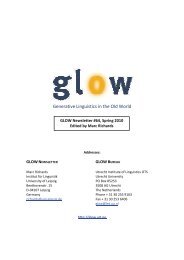Practical Information - Generative Linguistics in the Old World
Practical Information - Generative Linguistics in the Old World
Practical Information - Generative Linguistics in the Old World
You also want an ePaper? Increase the reach of your titles
YUMPU automatically turns print PDFs into web optimized ePapers that Google loves.
Tipp<strong>in</strong>g Po<strong>in</strong>tsCharles Yang, University of PennsylvaniaThe human memory is impressively large and capable of stor<strong>in</strong>g detailed l<strong>in</strong>guistic<strong>in</strong>formation. These f<strong>in</strong>d<strong>in</strong>gs raise important questions for <strong>the</strong> role of <strong>the</strong> grammar, aswhat can be stored needn't be computed. But evidence from language acquisition that notonly is <strong>the</strong> grammar necessary, children are extremely adept at identify<strong>in</strong>g <strong>the</strong> types ofl<strong>in</strong>guistic patterns (e.g., exceptions and rules) and learn<strong>in</strong>g <strong>the</strong>m differently.The ma<strong>in</strong> thrust of this work is to develop a calculus (Yang 2005), one which builds on<strong>the</strong> third factor of efficient computation (Chomsky 2005), that weighs <strong>in</strong> on <strong>the</strong> balancebetween storage and computation. We suggest that grammar/rule emerges at certa<strong>in</strong>tipp<strong>in</strong>g po<strong>in</strong>ts, where <strong>the</strong> number of rule-follow<strong>in</strong>g items greatly exceeds <strong>the</strong> number ofexceptions. The calculation of <strong>the</strong> tipp<strong>in</strong>g po<strong>in</strong>t is supported by psychol<strong>in</strong>guisticevidence, which suggests that exceptions cause delay <strong>in</strong> <strong>the</strong> real time computation ofrules. Under very general assumptions, it is possible to derive that a rule/processapplicable to N items can tolerate no more than N/ln(N) exceptions before los<strong>in</strong>gproductivity, i.e. all items are subject to lexicalized storage.We present two classes of evidence to showcase tipp<strong>in</strong>g po<strong>in</strong>ts <strong>in</strong> language.First, it is well known that 80-90% of English words are primarily stress <strong>in</strong>itial (Cutler &Carter 1987), yet no <strong>the</strong>ories of English metrical stress, or English learn<strong>in</strong>g children, treatEnglish as a quantity <strong>in</strong>sensitive system. Transparently, a statistical majority of 80-90%does not guarantee productivity. Through a corpus study of child directed English, weshow that <strong>the</strong> tipp<strong>in</strong>g po<strong>in</strong>t model accounts for <strong>the</strong> developmental stages <strong>in</strong> metrical stressacquisition, while support<strong>in</strong>g Halle's <strong>the</strong>ory of English stress (1998).Second, it is <strong>in</strong>structive to study cases where grammar fails, a most prom<strong>in</strong>ent case be<strong>in</strong>g<strong>the</strong> so-called "paradigmatic gaps" (e.g., stride-strode-*strode/?*stridden). Gaps emergedue to <strong>the</strong> absence of productive process, which arises when exceptions exceed <strong>the</strong>critical tipp<strong>in</strong>g po<strong>in</strong>t (N/ln N). We show that several well known <strong>in</strong>flectional gaps <strong>in</strong>English, Polish, Spanish and Russian are predictable on purely numerical basis.





